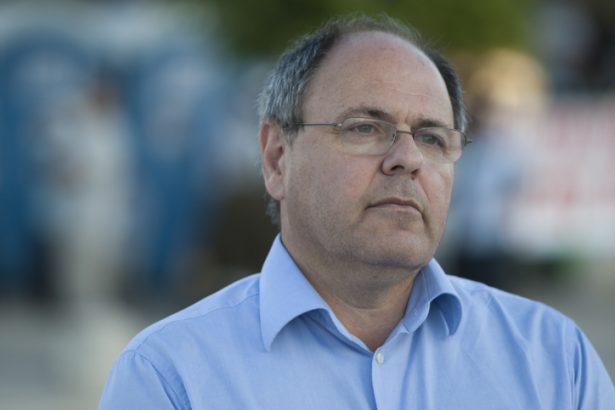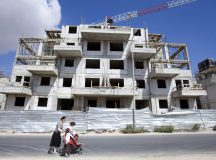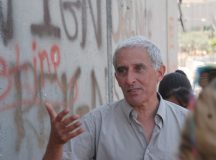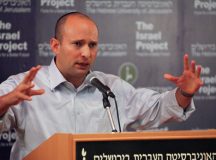Settlement construction is a controversial topic within Israel and is often the subject of international criticism and concern. Fathom Assistant Editor Lorin Bell-Cross spoke with Dani Dayan, former Chairman and current Chief Foreign Envoy of the Yesha Council, an umbrella organisation which represents Jewish settlements in the West Bank (known to Jews by their biblical names of Judea and Samaria). For an alternative view on the settlements see Fathom’s interview with Lior Amihai here.
Part 1: The Settlement Project
Lorin Bell-Cross: You are a supporter of settlement construction. Is the current Israeli government?
Dani Dayan: The answer is complex; I of course am a firm supporter of constructing housing for new Jewish families in Judea and Samaria and of the renaissance of Jewish life in this ancient cradle of Judaism and the Jewish civilisation. Regarding the current Israeli government, the answer is much more complex. I cannot judge their intentions; I can only judge policy and results and I must say that the results are poor. There have been highly publicised announcements regarding potential construction, but very little was done on the ground. Moreover, I would say that in the last six months there has been a complete freeze in planning. Today we still see construction because there was planning in the pipeline, but if you do not plan for construction then the pipeline will dry up and, a year from now, construction will cease. Therefore, I cannot say that I am satisfied with the record of the current government. The world’s perception of the Netanyahu government’s attitude to settlement construction is completely different to the reality – they assume that the Netanyahu government is building at high rates in Judea and Samaria.
LBC: Before the 2013 Israeli elections, a Panels poll suggested that 81.9 per cent of the Israeli public thought that settlements should be the first source of budget cuts. To what extent do you feel the Israeli public is supportive of the settlement project?
DD: I am not aware of this specific poll and I find the results surprising. Israeli opinion polls are frequently used as a political tool; you can find a poll to corroborate every position (even contradicting positions), so I wouldn’t allocate too much importance to a specific poll.
I feel very comfortable with the level of support emanating from Israeli society towards us. We are a democratic country, it is completely absurd to believe that we could have achieved what we have – or even close to that – without staunch support from the general public; the governments that made our achievements possible were elected democratically.
Obviously there are sectors in society which are opposed to what we do and they oppose it very loudly, but mainstream Israeli society supports us. I would even dare say that the average Israeli admires what we are doing for the sake of the country. The grassroots support that we see is heart-warming and this is despite a well-orchestrated and very well-funded opposition campaign, funded in part by European governments, and other European actors, to defame us. They use, among other things, completely false or cherry-picked data about the alleged cost of our communities.
LBC: What do you see as the biggest threat to the settlement project in the West Bank?
DD: I am quite optimistic regarding what you just referred to as the ‘settlement project’. We are not a ‘project’ any more than the creation of the State of Israel was a ‘project’ or the hundreds of kibbutzim, moshavim or development towns that were established all across Israel were ‘projects’. We are a cause – a fulfilment – of the Zionist dream of the revival of Jewish life in the ancient Land of Israel.
Having said that, the most serious threat I see to our cause comes from within: fringe elements very small in number but very loud in their actions, for example the so-called ‘price tag’ attacks, which are violent and criminal acts. They desecrate mosques, harm property and in some cases even cause physical harm to innocent Palestinians, Israelis, soldiers or civilians. These are despicable actions which have an extremely damaging effect on our communities.
They are carried out by an extremely small number of individuals, but they damage a whole community. I and my colleagues in the leadership of our movement have unequivocally condemned these acts, innumerable times. I myself have been to the Minister of Justice, Chief Inspector of Police, the Attorney General, the army and the secret service to demand more effectiveness in their actions to eradicate this sort of activity. The people who participate in this sort of activity (not all of whom are residents of Judea and Samaria) are both criminals and, excuse me, idiots.
Part 2: Settlements and Israel’s international standing
LBC: Support for a boycott of settlement products has gathered some support in the UK. Many in the international community see the settlements as an obstacle to peace. David Cameron described a recent Israeli land appropriation in the West Bank as ‘deplorable’. How do you respond to Israelis like Ari Shavit who argue that ‘not only is settlement activity wrong … it endangers our relationship with our neighbours and our legitimacy worldwide … it endangers our ability to win hearts and minds in the Jewish world’?
DD: I am aware of the fact that from a public opinion perspective there is damage. Incidentally, a few days ago I saw a replay of the first interview (in 1977) which former-Prime Minister Menachim Begin gave to Israeli television when he was still prime minister-elect. He was asked, ‘How do you come to Washington or to London to speak on behalf of Judea and Samaria when not even one senator, MP or leader accepts the policy that Judea and Samaria should be an integral part of the State of Israel?’ Mr Begin’s answer was very clear: ‘Why would they be more pro-Israeli than the previous Israeli governments?’ That is exactly the problem: unfortunately even the governments which promoted the construction of communities in Judea and Samaria were somewhat shy in explaining why.
If the government of Israel does not make it clear that Judea and Samaria will remain part of the State of Israel, and explain the logic of the construction of homes for Jewish families in those areas, then we cannot expect the world to understand it or to accept it. As Mr Begin said we cannot expect the world to be more ‘pro-Israeli’ than the Israeli government .
That’s the reason that when I stepped down in January 2013 as Chairman of the Yesha Council, I decided to form an international arm of our movement in order to explain that. Today I am welcomed even in the European External Action Service and the US State Department ; but it is still not an alternative to a government policy which says loud and clear what the importance of the settlements is.
I also have no doubt whatsoever that, at some point in the future, the international community (even if they will not admit it) will understand the vital role we play and understand that we were instrumental in preventing the establishment of a destabilising Palestinian entity in the heart of the region – which would destabilise Jordan and Israel. This happened with the destruction of the Iraqi nuclear reactor in 1981 (again by Prime Minister Begin), which the world condemned. Today, the world congratulates and thanks Israel for doing that and I’m quite sure the same thing will happen regarding our communities here.
LBC: To what extent do you think the announcement of settlement construction plans during the recent Kerry-led peace talks with the Palestinians was a factor in their collapse?
DD: Not at all. If anything, what caused the damage was the American and European reaction to the announcements – not the announcements themselves. The announcements made during the negotiations were about construction planned for 18 or 24 months down the road. Therefore, they had no real implications or impact on the negotiations themselves or on the ability to implement an agreement. What caused a psychological effect, what Secretary Kerry called ‘a cloud over the negotiations,’ was not the announcement but the turmoil created by the American and European reaction.
It would have been much wiser if Secretary Kerry and the European Union, instead of denouncing and condemning, would have turned to President Abbas and told him to stop dragging his feet and to be more flexible, otherwise the Israelis would convert those announcements into actual construction. Mr Kerry knew how to do this towards Israel: he threatened Israel with a third Intifada, with an international boycott and even, unfortunately, used the word ‘apartheid’ in one instance regarding the future of Israel. When it came to the real intransigent player, the Palestinians, for some reason he did not use the same methods. He had a golden opportunity to use the settlement announcements as a catalyst for the advancement of the negotiations but unfortunately he chose to use it as an obstacle. It’s his fault – not Israel’s fault.
This is further proof of my claim that the opposition to the housing for Jewish families in Judea and Samaria has acquired the status of a quasi-dogma: a religious article of faith which is irrational in the sense that it is detached from its real geo-political significance.
LBC: Even you, I think, accept that the current situation cannot remain as it is. In an article for the New York Times you set out a plan: ‘Israel must initiate an ambitious and bold plan to improve every aspect of day-to-day life for Palestinians … The security barrier separating Judea and Samaria from the rest of Israel should ultimately be dismantled … Barriers, checkpoints and military restrictions on movement must be lifted.’ How do you see these ideas being implemented given the tense climate in the West Bank and Palestinian opposition to interim measures that are proposed as an alternative to statehood?
DD: First of all, I think that the current situation can be maintained, but it’s not desirable. It depends very much on the other side, whether or not my ideas can be implemented; you need two to tango.
It’s quite clear today that a political agreement to end the conflict is not in anyone’s reach; we are unfortunately far from it. Therefore, what was suggested in the op-ed in the New York Times is what I call ‘peaceful non-reconciliation.’ If we cannot solve the conflict right now, let’s opt, in the meantime, for the second best – the fairest possible way to conduct our co-existence until a political solution becomes possible. There are improvements to the situation which we can make unilaterally, for instance the erasing of checkpoints or the ultimate dismantling of the security barrier that Israel was forced to erect some ten years ago. But it is then up to the Palestinians. If what I’m suggesting is adopted by my government, it will pose the Palestinians with a political and moral decision; all I can say is that I hope they do not, as usual, miss an opportunity.
LBC: Ehud Barak, Tzipi Livni, Ehud Olmert and even Dan Meridor have warned that Israel will face a choice in the future between being Jewish and democratic if peace talks fail and there is no Palestinian state. What is your response to their concerns?
DD: Their mistake stems from the fact that they only look at what I would call the simplistic solutions. They speak in terms of ‘one-state’ or ‘two-states’ whilst in reality the Jewish-Palestinian conflict is a unique one, a peculiar one, and will need a unique and peculiar formula to solve it. One of the tragedies of the conflict is that the tyranny of the two-state solution in international discourse has prevented innovative thinking. Whoever dared to challenge that formula was immediately targeted as a lunatic, as an extremist; and that inhibited out-of-the-box thinking, which is essential to resolve the conflict.
In my view there are four principles that should be part of any solution. First, Israel should be a Jewish and democratic country. Second, Israel has to be in charge of security over the whole area from the Mediterranean to the Jordan because otherwise any arrangement will collapse and will succumb to terrorism and violence. Third, no individual, Israeli or Palestinian, should be forced to leave his or her home. The fourth principle is that, every person, Israeli, Jewish, or Palestinian should be a fully-fledged citizen of the state that governs their life.
The simplistic one-state or two-state formulas contradict some of these principles, if not all of them, so now we have to think of innovative, out-of-the-box solutions for the conflict. Our ex-President Shimon Peres, who is now 91 years old, was already a senior cabinet minister in the 1970s. Before he switched to what I call the ‘Oslo religion’, he advocated two precepts: he used to talk about the ‘Jordanian option’ as opposed to the ‘Palestinian option’ and more importantly, he used to speak about a functional compromise, not a territorial one. And who knows, I think that maybe we will go back to those principles now that everything else is failing. For instance, enlarging the pie (including Jordan in the equation) and dividing – this is the most important thing in my opinion – dividing authority and not territory. We have to free ourselves from the constraints of rigid thought and seek a solution to the conflict that will allow Israel to remain a Jewish and democratic country and the Palestinians to enjoy fully fledged citizenship of a country that rules their lives and homes.






































He’s not even honest, and offers nothing new – just Israeli domination over whatever he feels Israel can dominate. No real mention of Palestinians, nothing. Disgusting thief.